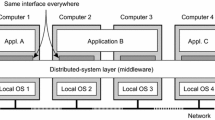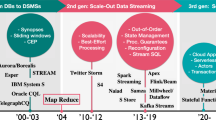Abstract
Causal consistency has attracted considerable attention in distributed systems because it meets the high availability and high-performance requirements in the presence of network partitions. Existing causal consistency models seldom pay attention to hot data governance and run the data stabilization process periodically and thus fail to meet the user requirements of real-time data and high concurrency. In response to this problem, this study proposes a model based on thermal data governance, the Horae model, which simplifies causal sequence verification by sorting, accelerates data stability, and optimizes model update visibility and read response latency. Furthermore, the Horae model stores hot data, reduces the number of partition loads, increases operation parallelism, and ultimately improves throughput. Theoretical analysis and simulation experiments show that the proposed model outperforms existing models in terms of throughput, read response time, and update visibility.










Similar content being viewed by others
Data availability
All data and materials support their published claims and comply with field standards.
Code availability
Code supports their published claims and complies with field standards.
References
Aldin HNS, Deldari H, Moattar MH, Ghods MR (2020) Strict timed causal consistency as a hybrid consistency model in the cloud environment. Future Gener Comput Syst 105:259–274. https://doi.org/10.1016/j.future.2019.11.038
Maheshwari R, Kumar N, Shadi M, Tiwari S (2021) Consensus-based data replication protocol for distributed cloud. J Supercomput 77:8653–8673. https://doi.org/10.1007/s11227-021-03619-5
Beillahi SM, Bouajjani A, Enea C (2021) Robustness against transactional causal consistency. Log Methods Comput Sci 17:12
Gomes C, Tavares E, Junior MNDO, Nogueira B (2021) Cloud storage availability and performance assessment: a study based on NoSQL DBMS. J Supercomput. https://doi.org/10.1007/s11227-021-03976-1
Xiang Z, Vaidya NH (2020) Global stabilization for causally consistent partial replication. In: International Conference of Distributed Computing and Networking (ICDCN), ACM, New York, NY pp 1–10
Cadambe VR, Lyu S (2021) CausalEC: a causally consistent data storage algorithm based on cross-object erasure coding. Comput Res Repos. http://arxiv.org/pdf/2102.13310.
Tu L, Liu S, Wang Y, Zhang C, Li P (2020) An optimized cluster storage method for real-time big data in Internet of Things. J Supercomput 76:5175–5191. https://doi.org/10.1007/s11227-019-02773-1
Zhu T, Guo J, Zhou H, Zhou X, Zhou AY (2018) Consistency and availability in distributed database systems. J Softw 29:131–149. https://doi.org/10.13328/j.cnki.jos.005433
Liu P, Jiang Z, Cao X (2018) Node selection algorithm during multi-nodes repair progress in distributed storage system. Comput Res Dev 55:1557–1568. https://doi.org/10.7544/issn1000-1239.2018.20160915
Lamport L (1978) Time, clocks, and the ordering of events in a distributed system. Commun ACM 21:558–565. https://doi.org/10.1145/359545.359563
Gunawardhana C, Bravo M, Rodrigues L (2017) Unobtrusive deferred update stabilization for efficient geo-replication. In: Proceedings of the 2017 USENIX Conference on Usenix Annual Technical Conference, USENIX Association, Santa Clara, CA, USA, pp 83–95
Roohitavaf M, Demirbas M, Kulkarni S (2017) CausalSpartan: causal Consistency for Distributed Data Stores Using Hybrid LOGICAL CLOCKS. In: 2017 IEEE 36th Symposium on Reliable Distributed Systems (SRDS), IEEE, Hong Kong, China, pp 184–193
Ajoux P, Bronson N, Kumar S, Lloyd W, Veeraraghavan K (2015) Challenges to Adopting Stronger Consistency at Scale. In: HOTOS'15: Proceedings of the 15th USENIX Conference on Hot TOPICS in Operating Systems, USENIX, Kartause Ittingen, Switzerland, p 13
Lloyd W, Freedman MJ, Kaminsky M, Andersen DG (2013) Stronger semantics for Low-Latency Geo-Replicated Storage. In: Proceedings of the 10th USENIX Conference on Networked Systems Design and Implementation, USENIX Association, Lombard, IL, pp 313–328
Spirovska K, Didona D, Zwaenepoel W (2018) Wren: nonblocking Reads in a Partitioned Transactional Causally Consistent Data Store. In: 2018 48th annual IEEE/IFIP International Conference ON Dependable Systems and Networks (DSN), IEEE, Luxembourg, Luxembourg, pp 1–12
Du J, Iorgulescu C, Roy A, Zwaenepoel W (2014) GentleRain: Cheap and Scalable Causal Consistency with Physical Clocks. In: Proceedings of the ACM Symposium on Cloud Computing, Association for Computing Machinery, Seattle, WA, USA, pp 1–13
Lloyd W, Freedman MJ, Kaminsky M, Andersen DG (2011) Don't Settle For Eventual: Scalable Causal Consistency for Wide-Area Storage with COPS. In: Proceedings of the Twenty-Third ACM SYMPOSIUM ON OPERATING SYSTEMS PRINCIPLES, ASSOCIATION FOR COMPUTING MACHinery, Cascais, Portugal, pp 401–416
Guibas LJ, Sedgewick R (1978) A dichromatic Framework for Balanced Trees. In: 19th Annual Symposium on Foundations Of Computer Science (SFCS 1978), IEEE, Ann Arbor, MI, USA, pp 8–21
Kulkarni SS, Demirbas M, Madappa D, Avva B, Leone M (2014) Logical physical clocks. In: Aguilera MK, Querzoni L, Shapiro M (eds) Principles of Distributed Systems. Springer International Publishing, Cham, pp 17–32
Roohitavaf M, Demirbas M, Kulkarni S (2018) CausalSpartanX: causal consistency and non-blocking read-only transactions. http://arxiv.org/pdf/181207123.
Roohitavaf M, Kulkarni S (2018) DKVF: A Framework for Rapid Prototyping and Evaluating Distributed Key-Value STORES. In: 2018 33rd IEEE/ACM International Conference on Automated Software Engineering (ASE), IEEE, Montpellier, France, pp 912–915
Spirovska K, Didona D, Zwaenepoel W (2021) Optimistic causal consistency for geo-replicated key-value stores. IEEE Trans Parallel Distrib Syst 32:527–542. https://doi.org/10.1109/TPDS.2020.3026778
Roohitavaf M, Kulkarni SS (2016) GentleRain+: making gentlerain robust on clock anomalies. CoRR abs/1612.05205.
Kakwani D, Nasre R (2020) Orion: Time Estimated Causally Consistent Key-Value Store. In PaPoC '20: Proceedings of the 7th Workshop on Principles and Practice of Consistency For Distributed Data, ACM, New York, NY, pp 1–6
Dziuma D, Fatourou P, Kanellou E (2015) Consistency for transactional memory computing. In: Guerraoui R, Romano P (eds) Transactional Memory Foundations, Algorithms, Tools, and Applications: COST Action Euro-TM IC1001. Springer International Publishing, Cham, pp 3–31
Zhang I, Sharma NK, Szekeres A, Krishnamurthy A, Ports DRK (2018) Building consistent transactions with inconsistent replication. ACM Trans Comput Syst 35:1–37. https://doi.org/10.1145/3269981
Akkoorath DD, Tomsic AZ, Bravo M, Li Z, Crain T, Bieniusa A, Preguiça N, Shapiro M (2016) Cure: Strong Semantics Meets High Availability and Low Latency. In: 2016 IEEE 36th International Conference on Distributed Computing Systems (ICDCS), IEEE, Nara, Japan, pp 405–414
Spirovska K, Didona D, Zwaenepoel W (2019) PaRiS: Causally Consistent Transactions with Non-Blocking Reads and Partial Replication. In: 2019 IEEE 39th International Conference On Distributed Computing Systems (ICDCS), IEEE, Dallas, TX, USA, pp 304–316
Acknowledgements
The authors of the paper express their gratitude to AJE for providing language assistance on this work.
Funding
This work was supported by the National Natural Science Foundation of China (61802106), the Natural Science Foundation of Hebei Province (F2016201244) and the Social Science Foundation of Hebei Province (HB18SH002).
Author information
Authors and Affiliations
Contributions
JT designed the study and performed the experiments; QY performed the experiments, analyzed the data, and wrote the manuscript.
Corresponding author
Ethics declarations
Conflict of interest
The authors declare that they have no known competing financial interests or personal relationships that could have appeared to influence the work reported in this paper.
Additional information
Publisher's Note
Springer Nature remains neutral with regard to jurisdictional claims in published maps and institutional affiliations.
Rights and permissions
About this article
Cite this article
Tian, J., Yang, Q. Horae: causal consistency model based on hot data governance. J Supercomput 78, 4574–4599 (2022). https://doi.org/10.1007/s11227-021-04030-w
Accepted:
Published:
Issue Date:
DOI: https://doi.org/10.1007/s11227-021-04030-w




